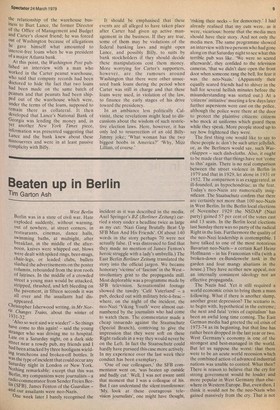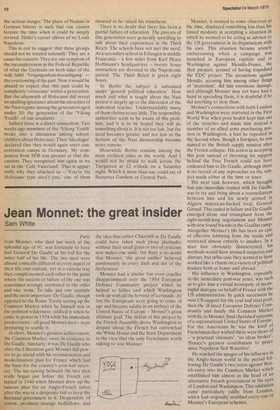Beaten up in Berlin
Tim Garton Ash
West Berlin Berlin was in a state of civil war. Hate exploded suddenly, without warning, out of nowhere, at street corners, in restaurants, cinemas, dance halls, swimming baths, at midnight, after breakfast, in the middle of the afternoon, knives were whipped out, blows were dealt with spiked rings, beer-mugs, chair-legs, or leaded clubs, bullets Slashed the advertisements on the poster columns, rebounded from the iron roofs of latrines. In the middle of a crowded street a young man would be attacked, stripped, thrashed, and left bleeding on the pavement, in fifteen seconds it was all over and the assailants had disappeared. Christopher Isherwood writing, in Mr Norris Changes Trains, about the winter of 1931_32.
'Also so weit sind wir wieder!' — So things have come to this again! — said the young stranger who was driving me to hospital. Late on a Saturday night, on a dark side street near a rowdy pub, my friends and I !lad been attacked by three hooligans wielding truncheons and broken-off bottles. It Was the type of incident that could occur any Saturday night in London or New York. Nothing remarkable: except that this was Berlin, my companions were journalists — a radio commentator from Sender Freies (SFB), James Fenton of the Guardian — .and our assailants were neo-Nazis.
One week later I barely recognised the incident as it was described in the media. Axel Springer's BZ (Berliner Zeitung) carried a story under a headline twice as large as my cut: 'Nazi Gang Brutally Beat Up SFB Man And His-Friends'. Of about 140 words in the story perhaps 70 were not actually false. (I was distressed to find that they made no mention of James Fenton's heroic struggle with a lady's umbrella.) The East Berlin Berliner Zeitung translated the story into the official jargon. We became honorary 'victims' of 'fascism' in the West — involuntary grist to the propaganda mill. Most deplorable was a programme made by SFB television. Sensationalist footage showed the tawdry 'Café Vaterland' — a pub, decked out with military bric-a-brac — where, on the night of the incident, the neo-Nazi 'Viking Youth' were almost outnumbered by the journalists who had come to watch them. The commentator made a cheap innuendo against the Staatsschutz (Special Branch), contriving to give the impression that they were soft on these Right radicals in a way they would never be on the Left. In fact the Staatsschutz could hardly have pursued this case more actively. In my experience over the last week their conduct has been exemplary.
'One of our colleagues,' the SFB commentator went on, 'was beaten up outside and badly cut.' Well, I was not aware until that moment that I was a colleague of his. But I can understand the silent transference: 'My, look at these courageous television journalists', one might have thought, 'risking their necks — for democracy.' I had already realised that my cuts were, as it were, vicarious: borne that the media men should have their story. And not only the media men. The same programme showed an interview with two persons who had gone along on that Saturday night to see what this terrible pub was like. 'We were so scared afterwards', they confided to the television cameras, 'that we didn't dare open the front door when someone rang the bell, for fear it was the neo-Nazis.' (Apparently their equally scared friends had to shiver in the hall for several hellish minutes before the misunderstanding was sorted out.) At a 'citizens' initiative' meeting a few days later further aspersions were cast on the police, although the police were there at the door to protect the plaintive citizens: citizens who mock at uniforms which guard them while they speak. More people stood up to say how frightened they were.
The first thing one would like to say to these people is: don't be such utter jellyfish, or, as the Berliners would say, such Waschlappen — such dish-cloths. Also, it ought to be made clear that things have not 'come to this' again. There is no real comparison between the street violence in Berlin in 1979 and that in 1929, let alone in 1931 or 1932. The comparison is as exaggerated, as ill-founded, as hypochondriac, as the fear. Today's neo-Nazis are numerically insignificant. The Staatsschutz confirm that there are certainly not more than 100 neo-Nazis in West Berlin. In the Berlin local elections of November 1929 the NSDAP (Nazi party) gained 57 per cent of the votes cast and 13 seats. In the Berlin local elections last Sunday there was no party of the radical Right in the lists. Furthermore the quality of the neo-Nazi leadership is contemptible. I have talked to one of the most notorious Bavarian neo-Nazis — a certain Karl Heinz Hoffmann — in his Franconian villa (with a broken-down ex-Bundeswehr tank in the garden and four mangy alsatians in the house.) They have neither new appeal, nor an internally consistent ideology nor an effective propaganda.
The Nazis had. Yet it still required a world economic crisis to bring them a mass following. What if there is another slump, another great depression? The scenario is, to begin with, hypothetical in the extreme; the next and fatal 'crisis of capitalism' has been an awful long time coming. The East German media had greeted the oil crisis of 1973-74 as its beginning, but that line has rather been dropped in the last year or two. West Germany's economy is one of the strongest and best-managed in the world. But let us suppose the worst: that there were to be an acute world recession which the combined action of advanced industrial nations was unable to control. What then? There is reason to believe that the cry for strong government would be louder and more popular in West Germany than elsewhere in Western Europe. But, even then, I think it would not be the neo-Nazis who gained massively from the cry. That is not the serious danger. The place of Nazism in German history is such that one cannot foresee the time when it could be simply revived. Hitler's career allows of no Louis Napoleon.
This is not to suggest that these groups should not be treated seriously. They are a cause for concern. They are one symptom of the incompleteness in the Federal Republic of what the Germans on both sides of the wall label Wergangenheits-bewaeltigung' — the overcoming of the past. Now it would be absurd to expect that this past could be completely 'overcome' within a generation. But the aftermath of Holocaust did reveal an apalling ignorance about the atrocities of the Nazi regime among the generation aged under 30: the generation of the 'Viking Youth', of our assailants.
Indeed there is a direct connection. Two weeks ago members of the 'Viking Youth' broke into a discussion among schoolchildren about Holocaust. Their 'ideologist' declared that they would again erect concentration camps in Germany. My companion from SFB was present at that discussion. They recognised him again as we sat in the 'Café Vaterland'. That is apparently why they attacked us – 'You're the Holocaust type aren't you,' one of them shouted as he raised his truncheon.
There is no doubt that there has been a partial failure of education. The parents of this generation were generally unwilling to talk about their experiences in the Third Reich. The schools have not met the need. At a secondary school in Erlangen in middle Franconia – a few miles from Karl Heinz Hoffmann's headquarters – twenty hours instruction are devoted to the Napoleonic period. The Third Reich is given eight hours.
In Berlin the subject is subsumed under 'general political education'. How much and what is taught about the Nazi period is largely up to the discretion of the individual teacher. Understandably many of them choose to say little. The responsible authorities seem to be aware of this problem, and it is to be hoped they will do something about it. It is not too late, but the need becomes greater and not less as the horrors of the Nazi dictatorship become more remote.
Meanwhile Berlin remains among the most civilised cities in the world. And I would not be afraid to walk across the Tiergarten at 12 o'clock on a Saturday night. Which is more than one could say of Battersea Gardens or Central Park.



































 Previous page
Previous page